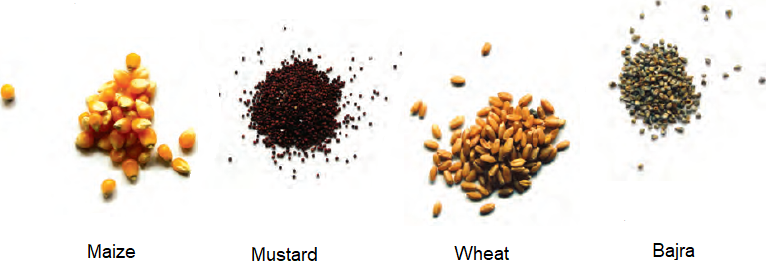NCERT Class 5 EVS Chapter 19 – A Seed Tells a Farmer’s Story helps students understand how food or a crop is grown and produced by farmers. It further deals with farmers’ stories of the hardships faced by them in farming. The chapter, as well as the solutions that we are providing here, have been designed to help students learn about the need for irrigation, fertilisers, different types of crops grown in some areas, seed germination, and dispersal. Further, these NCERT Solutions will act as great reference material for students. They can prepare well for exams using these resources.
NCERT Solutions for Class 5 EVS Chapter 19 A Seed Tells a Farmers Story
Access NCERT Solutions for Class 5 EVS A Seed Tells a Farmer’s Story
Tell:
Q1: Are rotis made in your home? From which grains are they made?
Answer: Yes, rotis are made in my home. They are made from wheat and sometimes from rice and ragi.
Q2: Have you eaten roti made from bajra or jowar? Did you like these?
Answer: Yes, I have eaten roti made from bajra and jowar. They were very tasty.
Find out and Write:
Q1: In your house, what is done to protect grains and pulses from insects?
Answer: We use to keep pulses and grains in airtight containers, and some pulses are sun-dried.
Q2: Which are the different festivals related to farming, celebrated in different seasons? Find out more about any one such festival and write in your notebook – The name of the festival, in which season it is celebrated, in which states of India, what special foods are made, whether it is celebrated only at home with the family, or together with many people.
Answer: There are many festivals related to farming. They are Pongal, Lohri, Baisakhi, Makara Sankranthi, Holi and more. Makara Sankranthi is celebrated in Karnataka during the winter season. Yellu Bella is made as the main dish in this festival. In Tamilnadu, Makara Sankranthi is celebrated as Pongal. Likewise, Lohri is celebrated in Punjab during the winter season.
Q3: Talk to the elders in your family and find out if there were some special foods cooked earlier that are not cooked anymore.
Answer: Gruel is a food consisting of some type of cereal – oat, wheat, or rye flour or rice – boiled in water or milk were prepared at home earlier.
Q4: Find out about the crops – cereals, vegetables, pulses – that are grown in your area. Of those, is there anything that is famous across the country?
Answer: Many crops like wheat, coffee, pepper, banana, and rice are grown in our area. Of these, rice is famous across the country.
Q5: Can you recognise these grains?

Answer:

Discuss:
Q1: The bajra seed saw differences in the way Damjibhai and Hasmukh did farming (for example, in irrigation, ploughing, etc.). What were these differences?
Answer: Damjibhai did farming in a different way than how Hasmukh did. Damjibhai followed the traditional method of farming. He used bullocks to plough the field. He stored grains to be used as seeds. Hasmukh, on the other hand, started modern or new methods of farming. He bought a tractor to plough the field. Expensive fertilisers were used to grow more crops.
Q2: Hasmukh said, “With profits from our fields, we can progress.” What is your understanding of ‘progress’?
Answer: Progress means a better lifestyle. People get better standards of living like education, medical facility and nutritious food.
Write:
Q1: What kind of progress would you like to see in your area?
Answer: I would like to see well-equipped hospitals, better roads, a good transport system and a good education system in schools.
Think and Discuss:
Q1: What can happen to Hasmukh’s farm after some years?
Answer: Hasmukh’s farm will lose fertility after some years because he is using chemical fertilisers.
Q2: Damjibhai’s son Hasmukh chose to become a farmer like his father. Hasmukh’s son Paresh is not a farmer but a truck driver. Why would he have done so?
Answer: Paresh could see that his father was running into losses. Farming had become a capital-intensive activity with little profit. Hence, Paresh would have decided to switch to a new occupation.
Q3: The seeds were not sure that what Hasmukh was talking about was really progress. What do you feel?
Answer: I think the new method of agriculture tends to overexploit the soil and other resources. This leads to the loss of fertility of the soil, which may result in the land becoming barren. A machine can do the work of many people, which leaves many people jobless. Too much irrigation depletes the groundwater and thus leaves little water for the future. Apparently, it looks like progress, but it is not real progress.
Q4: Have there been any changes near your area which may be difficult to call ‘progress’? What changes are these? What are the different opinions about them?
Answer: Yes, there are many changes which may not be called progress in the real sense. Let us take the example of the growing number of vehicles on the road. More vehicles made travelling easier, but it is also the reason for air and noise pollution. Similarly, many machines have been invented which can do the job of thousands of people, and thus thousands of people are jobless.
Class 5 EVS Chapter 19
– A Seed Tells a Farmer’s Story includes different examples and questions, such as the following:
Changes in agricultural practices.
How do farmers get the seeds to plant?
Festivals related to farming.
Identifying and determining suitable conditions for farming and seed germination.
How do we grow food?
Tools used for preparing the field, cutting and harvesting.
Bajra seed.
These are some important topics and questions from CBSE Class 5 EVS Chapter 19. To know more, you can check out the solutions below:



It was useful